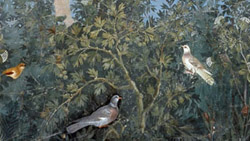
You are in: Home Page » Recipes of the ancient Pompeii » MORETARIA (Herbs' sauce)
MORETARIA (Herbs' sauce)

(Apic. 1, 35, 1) Ingredients:
- Mint
- Rue
- Coriander
- Fennel
- Lovage
- Pepper
- Honey
- Liquamen (or 3 tblsp soya sauce + 3 tsp anchovy paste)
- Vinegar
Instructions:
-------------
Smash and homogenize all the spices. Add honey and Liquamen and mix it all. Taste and, if necessary, add some vinegar. Serve with bread.





